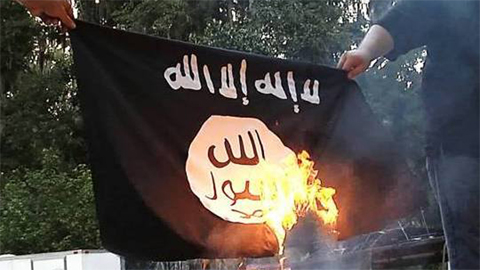TRIPOLI: Forces loyal to Libya's UN-backed government said Monday they had seized full control of Sirte from the Islamic State group, in a major blow to the jihadists who battled for months to retain their bastion. The battle for the coastal city, which was the last significant territory held by IS in Libya, cost the lives of hundreds of loyalist troops as well as an unknown number of IS fighters. "Our forces have total control of Sirte," Reda Issa, a spokesman for pro-government forces said. "Our forces saw Daesh (IS) totally collapse."
Forces allied with the country's unity government launched an offensive to retake the city on May 12, quickly seizing large areas of the city and cornering the jihadists. But IS put up fierce resistance with suicide car bombings, snipers and improvised explosive devices. "Daesh has totally collapsed and dozens of them have given themselves up to our forces," said a statement on the loyalist forces' official Facebook page. The capture of Sirte boosts the authority of the UN-backed Government of National Accord (GNA), which was launched in Tripoli last March but whose legitimacy is contested by a rival administration based in eastern Libya.
The United States started a bombing campaign in August at the request of the GNA to help local forces recapture the city, seized by jihadists in June 2015. As of December 1, US warplanes, drones and helicopters had conducted 470 strikes. Libya descended into chaos following the NATO-backed ousting of longtime dictator Muammar Gaddafi in 2011, with rival administrations emerging and well-armed militias vying for control of the country's vast oil wealth. The infighting and lawlessness allowed extremist groups such as IS to seize several coastal regions, giving the jihadists a toehold on Europe's doorstep.
Far longer than planned
The fall of Sirte-Gaddafi's hometown located 450 kilometers east of Tripoli-represents a major setback for IS, which has also faced a series of military defeats in Syria and Iraq. Iraqi forces are advancing on the IS stronghold of Mosul, while a US-backed Kurdish-Arab alliance last month launched an offensive to retake Raqa, the Syrian capital of the "caliphate" the jihadists proclaimed in 2014. "Losing it (Sirte) could cause a momentary loss of traction, but a lot will depend on what happens in Syria and Iraq and whether the ungoverned spaces in Libya will remain such," said Mattia Toaldo, a Libya expert with the European Council of Foreign Relations.
Toaldo said IS's failure to hold Sirte was due in part to the group's lack of resources in Libya. "They didn't manage to seize any considerable source of revenue," he said. "What they found in the banks in Sirte was not comparable to what they found in Mosul, nor was there an equivalent weapons stockpile." The fight for Sirte took far longer than originally planned, but signs emerged in recent days that IS fighters were about to capitulate. The Pentagon last week said that IS holdouts were staging a "last stand" in their former stronghold. Pro-GNA forces on Sunday said they had even arrested several jihadists attempting to swim to safety.
Almost seven months of fighting left nearly 700 GNA fighters dead and 3,000 wounded. Issa said in November that the final assault was held up mainly because it would "result in very intense street fighting and Daesh is determined to defend its positions right down to the last square metre." Claudia Gazzini, an analyst with the International Crisis Group think-tank, said that jihadists who escaped from Sirte had likely moved south to Sebha, closer to Libya's borders with Algeria and Niger. Others from the group are believed to be operating in Benghazi and possibly in and around Tripoli. "Despite the demise of IS in Sirte we cannot rule out that they will continue to have cells in other parts of the country," Gazzini said.- AFP











